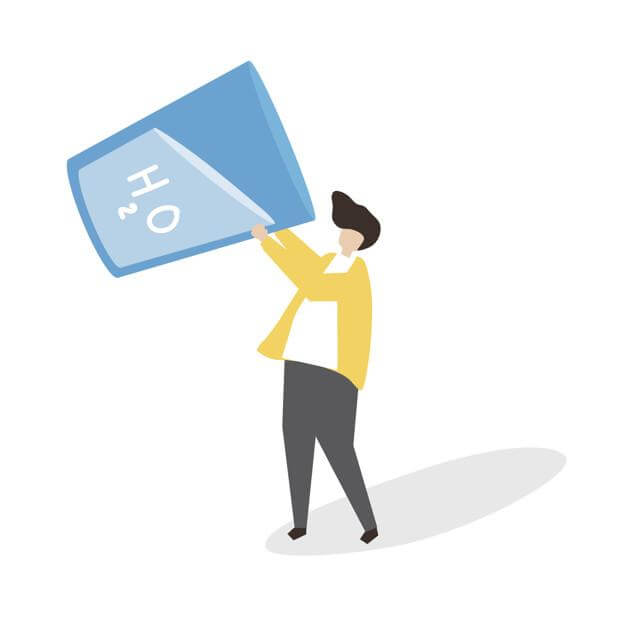Water: The Secret Tonic For Better Mental Well-being

Hey, do you know what you are made up of? Yes, you are made up of a secret tonic that governs the way you think, feel, and acts! Any guesses what this secret tonic is that we are referring to?
Hint: It makes up 60-70% of the adult body weight.
The answer is- WATER.
Water is the magic tonic that works miraculously well for your mental health. Research has shown that keeping yourself hydrated has a positive impact on your overall mental health wellness. When you keep yourself hydrated you will find yourself energized and all happy.
On the contrary, dehydration is found to be linked with an increased risk of anxiety and depression. Overall, the impact of the consumption of water on our mental health is immense.
Let us explore the impact of H2O on our brain!
Impact of Dehydration on Mental Health
Many studies have time and again studied the impact of dehydration on an individual’s mental health. Here are some of the key findings that suggest the impact of dehydration on your mental wellness is not positive.
Dehydration Contributes to Depression
A strong connection has been found between depression and dehydration. Especially chronic dehydration is found to be linked with starting depression symptoms in an individual. The reasons discussed below will help you further understand how dehydration causes depression.
According to a study conducted in 2018, it was found that people who drank water had a lower risk of depression when compared with their counterparts.
Dehydration Gives Rise To Anxiety
The same study that we have discussed above that was conducted on 3,000 adults found that drinking water reduces the risk of anxiety in individuals.
The study also suggested that dehydration can put an individual at the risk of developing anxiety. The natural calming properties of water/ the magic tonic H2O are such that when you have it in the proper amount it will keep the worries at bay for you.

Dehydration Affects Your Mood
Your water intake has an impact on how you feel. In fact, dehydration is one of the biggest reasons behind severe mood swings. The science underlying the relation between water and mood swings is that, when your brain doesn’t get enough water, the brain blood flow level reduces and impacts our mood.
A study in 2014 also supports this notion that individuals who have an optimal amount of water intake are calmer, happier, and healthier emotional regulation. Another reason why dehydration is linked with mood swings is that it affects the production of happiness hormones.
Dehydration Exposes You To Stress
There is a two-way relation between stress and dehydration. Dehydration causes stress and stress can cause dehydration. The magic tonic water is made up of electrolytes and when we are dehydrated, these electrolytes fall down leading to a feeling of stress.
By drinking sufficient water one can reduce the chances of the negative impact of stress and maintain the level of electrolytes in an individual’s body. Different studies have found that both males and females report reduced levels of tension when they keep themselves hydrated.
Am I Dehydrated?
Before you see these big impacts of dehydration in your life, you can always see the early signs of dehydration in your body. Interestingly, feeling thirsty alone is not the only sign that determines that your body needs water. Plus, with age, we lose our perception of thirst that is why looking at the other signs of dehydration.
This includes sign like:
- Feeling thirsty (the most obvious one).
- Having a dry mouth or skin (which may even result in itchiness).
- Increased hunger (as 20-30% of the water requirement is met by the food you consume).
- Frequent headaches (the oxygen supply to your brain reduces when you are dehydrated).
- Fatigue or sleepiness (the muscle might experience weakness).
- High blood pressure or fast heart rate.
- Crying without tears (this sign is a more typical sign of dehydration among children).
- Reduced urination or dark yellow color urine.
If you have been experiencing these signs of dehydration lately then you might want to monitor your water intake and safeguard your mental health.

Mental Health Benefits of Hydration
So far we have discussed the impact of dehydration on our mental health, now let us look at the benefits of keeping yourself hydrated.
Here is what water does to your mind and body:
- Water hydrates the cells, organs, and skin.
- Increases energy and focus.
- Improves your concentration.
- Alleviates symptoms of depression and anxiety.
- Enhances digestion and absorption of nutrients.
- Decreases the risk factor of cancer.
- Prevents you from severe mood swings.
How Much Water Should You Be Drinking?
You might read at different places that ideally consuming 1.5 liters of water is the amount of magic proportion you need to keep your mental wellness intact. But according to the dietician Clarke who has 30 years of clinical experience having 2.5 liters of water daily works the best.

Brownie Tip from the Author: Ok I know we have been referring to water as the magic tonic all this while. But, you don’t have to gulp all that water in a go. Consume a small amount of water throughout the day. You can also set an hourly water reminder in your phone or download apps that remind you of having optimum amounts of water throughout the day like social fever.
Now go grab that water bottle and start sipping on water.
P.S.: Keep yourself hydrated!




















